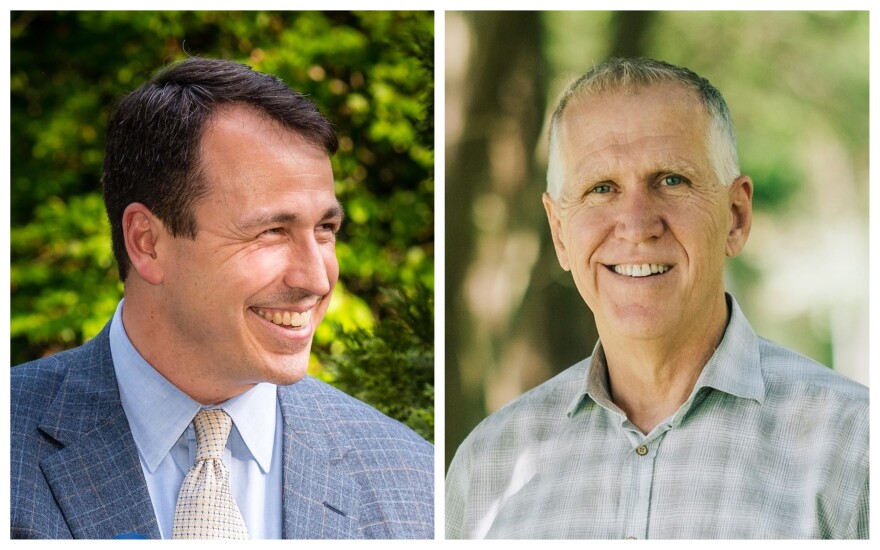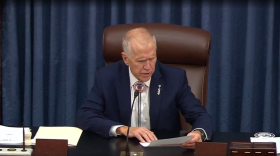In contrast to the chaotic presidential debate earlier in the week, the third and final face-off between the top contenders in North Carolina's senate race last night was relatively mellow.
Moderator and Spectrum News One Political Anchor Tim Boyum did not have to tell the senate candidates to let each other speak. Republican Senator Thom Tillis and his Democratic challenger Cal Cunningham aired out positions on the last pandemic relief package introduced in the Senate, the Supreme Court and mail-in voting.
Here’s the rundown on how they tackled those topics:

The Supreme Court
This race could ultimately determine which party controls the U.S. Senate. And the moves by GOP leaders to swiftly replace the late Justice Ruth Bader Ginsburg have shown that whoever controls the Senate controls whether Supreme Court nominees get a hearing.
Should Amy Coney Barrett recuse herself on election-based cases? @ThomTillis said that wasn't necessary, but he trusted her and if she needed to recuse herself, she would. #NCSenateDebate
— WUNC (@wunc) October 1, 2020
Tillis made the stakes clear in his opening remarks, saying President Trump's nominee Judge Amy Coney Barrett should be confirmed before the election.
"Only in America can a kid grow up in a trailer park and become a US Senator, or a mother of seven children can go on to be a US Supreme Court justice,” said Tillis.
Cunningham, an attorney and former state senator, accused Tillis of rushing partisan justices on to the court in order to “ file cases in front of those partisan justices, to do things like strike down the Affordable Care Act.”
Tillis said the president's nominee to the U.S. Supreme Court — if appointed — should not recuse herself in any potential cases involving the 2020 presidential election.
“I don't believe that she should (recuse herself), but that's a decision that she'll make based on the facts," Tillis said of Amy Coney Barrett, who awaits the Senate confirmation process. “It's a very well-documented recusal process, and I trust Amy Coney Barrett and all the nine justices to act appropriately.”
Cunningham declined to say whether he thinks Barrett is qualified to be on the nation's highest court. He said that, if elected, he would reserve judgment until meeting her.
“I would meet with her and I would put her through hearings and give her a job interview before I would give her my vote,” Cunningham said. “The fact of the matter is that stands in stark contrast to what Sen. Tillis has proposed."
The day after Supreme Court Justice Ruth Bader Ginsburg's death, Tillis told Trump supporters gathered at a rally in Fayetteville, North Carolina, that he'd support any of the justices Trump had on his list of potential candidates.
In 2016, Tillis opposed then-President Barack Obama’s nomination of Judge Merrick Garland, arguing that “the voice of the American people should be heavily weighted in that decision and their voice will soon be heard on Election Day.”
Absentee Voting
On another issue, Tillis said he believes absentee ballot rule changes pushed by North Carolina Democrats have “set the groundwork for lawsuits" in that state.
Tillis, who is voting by mail this year and has praised North Carolina's absentee voting process throughout the election cycle, said he is concerned about recent changes.
Should Amy Coney Barrett recuse herself on election-based cases? @ThomTillis said that wasn't necessary, but he trusted her and if she needed to recuse herself, she would. #NCSenateDebate
— WUNC (@wunc) October 1, 2020
Updated guidance unanimously passed last week by the North Carolina State Board of Elections is being challenged in state and federal court.
The two Republican members of the five-member board resigned shortly after receiving substantial pushback from state GOP leaders. The state’s Republican Party said Democrats misled the members into supporting the easing of certain voting procedures.
At the center of the debate is a six-day extension for counties to receive absentee ballots postmarked by Election Day and a process in which voters who filled out their ballots without the necessary witness information could receive an affidavit to correct the problem — rather than having to fill out an entirely new ballot.
“It's a dramatic change that I hope can be halted,” Tillis said.
Federal Judge William Osteen said Wednesday that the affidavit directive doesn’t comply with a ruling he issued in August upholding the need for a witness because it would effectively eliminate the witness requirement mandated under state law. Osteen's criticism of the memo the state elections board issued last week prompted the group to announce on Thursday it would halt plans to resolve ballot issue with voter affidavits.
Cunningham signaled support for the new process because he wants to ensure all eligible votes can be counted.
“We want people to participate, and I have confidence that we will end up in a place where folks will and should have confidence in the outcome,” Cunningham said.
‘Rubber Stamp’
Both candidates tried to distinguish themselves from the men at the top of the ticket. Cunningham refused to say whether he'd sign on to the climate or tax plans offered by his party's presidential nominee. When asked whether he’d vote for Biden’s tax plan, Cunningham responded: “I don't know what his tax plan is. What I know is the North Carolina tax plan, that is what I'm proposing."
And while Trump failed to do so during the presidential debate this week, Tillis denounced extremism.
"Any extreme organization or ideology we just absolutely have to speak against. Whether it's white supremacist or Antifa,” said Tillis.
Nonetheless, Tillis and Cunningham repeatedly accused each other of being rubber stamps for their party.
As the race comes down to the wire, analysts say this could be one of the most expensive races in history.











